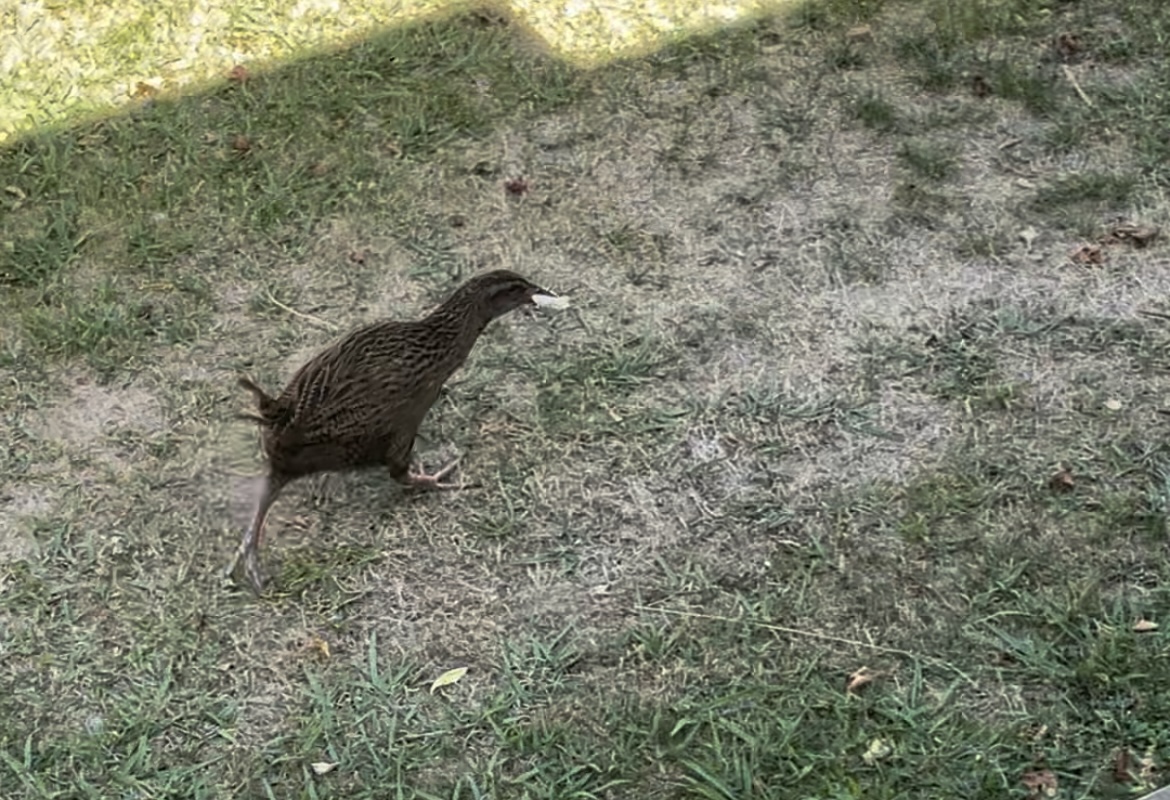Cheeky wekas thriving in Nelson


A food-stealing weka runs through a Nelson garden. Photo: Kate Russell.
Like many Nelsonians, journalist Kate Russell is familiar with weka roaming her backyard. She talks to Department of Conservation Motueka biodiversity ranger Leon Everett, and Scott Burnett, Te Tauihu/Top of the South regional conservation manager at Forest and Bird, about their cheeky presence in our city gardens.
They are giving household cats a run for their money, digging up gardens, stealing food, and even jumping on roofs.
Scott says that the weka population in Nelson has increased dramatically in the last 20 years from near zero to today’s relatively high population density.
“Twenty years ago, weka were uncommon across Nelson Tasman, however, by 2010 weka were becoming much more numerous across the region.”
Predator trapping, good breeding, and foraging conditions have helped populations to flourish and spread out in recent years.
There are four subspecies of weka and those found in our region are western weka.

Leon says residential areas of Nelson have a lot of vegetation and gardens which provide shelter for weka and opportunities to feed.
“There are also large bush areas around the edges of Nelson city, such as the Grampians, which provides a large amount of suitable habitat.
“In late summer, many younger birds will start spreading out and exploring once they leave their parents’ territories.”
Their diet is primarily invertebrates, fruit, and seeds, and they play an important role in distributing native plant seeds. They are also known to kill rats and mice.
“They can retain seeds for almost six weeks, which is the longest avian seed retention period ever recorded. This gives them the potential to disperse seed over one kilometre,” says Leon.
Weka are known as being “capable scavengers” and this can cause issues if food is left out, for example, in rubbish bags.
Leon says weka are not reliant on supplementary food or scraps.
“We ask that people do not feed weka as it can cause health and behavioural issues. If they find food around your property or are fed, then they might learn that it’s a good place to visit which can cause issues for householders.”
While searching for invertebrates, Leon says they may also dig up gardens. They are also good climbers and can jump around a metre high.
They can also live a long time.
“The oldest known bird lived to 19 years,” says Scott.

Scott explains that weka are difficult to relocate and establish and out of 100 translocations over the last century, only 14 were successful.
One reason for this may be their “extraordinary” homing instinct.
“In one notable case in the late 1970s, three weka were banded before being removed from Maud Island in the Marlborough Sounds. They were released several kilometres away on the mainland. However, the trio were back on the island within days, after a long hike and a 900-metre swim against the current.”
Scott also says weka can be “annoying” and he has caught them doing “enormous messy poops” on the floor of his central Nelson home.
“I’ve had them pulling seedlings from our vege beds, and breaking into our chicken run to get at the chicken feed and bossing our chickens around.”
Scott says weka are curious creatures and it is common for them to steal items they find interesting.
“If you see them absconding with something you can usually find it later just inside the vegetation they dragged it into.”
However, he says it is a “privilege” to have them around and implores Nelson residents to look after them.
Have you got a cheeky weka in your backyard? Send your encounters and photos to [email protected]
